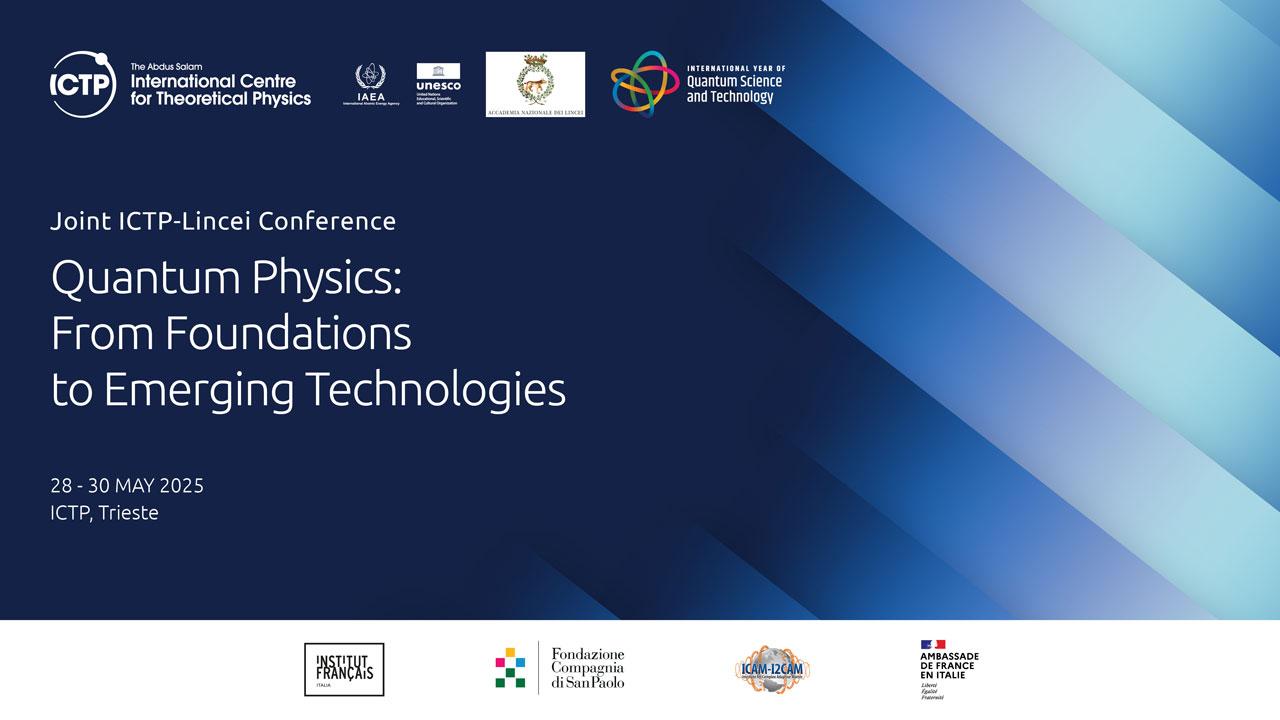
World-leading experts in quantum physics, including several Nobel laureates, will meet at ICTP from 28 to 30 May for an international conference celebrating quantum science. Titled “Quantum Physics: from Foundations to Emerging Technologies”, the event, co-sponsored by the Italian Accademia Nazionale dei Lincei, will focus on the history of quantum science, its impact on society, and selected advances of quantum science and technology.
Speakers will include the following Nobel laureates, all of whom have made important contributions to quantum science and technology:
- Alain Aspect, University Paris-Saclay, France
Nobel Prize in Physics 2022 “for experiments with entangled photons, establishing the violation of Bell inequalities and pioneering quantum information science” - Eric Cornell, University of Colorado, USA
Nobel Prize in Physics 2001 “for the achievement of Bose-Einstein condensation in dilute gases of alkali atoms, and for early fundamental studies of the properties of the condensates” - David Gross, KITP Santa Barbara, USA
Nobel Prize in Physics 2004, “for the discovery of asymptotic freedom in the theory of the strong interaction” - Duncan Haldane, Princeton University, USA
Nobel Prize in Physics 2016, “for theoretical discoveries of topological phase transitions and topological phases of matter” - Serge Haroche, Collège de France
Nobel Prize in Physics 2012, “for ground-breaking experimental methods that enable measuring and manipulation of individual quantum systems” - Wolfgang Ketterle, MIT, USA
Nobel Prize in Physics 2001, “for the achievement of Bose-Einstein condensation in dilute gases of alkali atoms, and for early fundamental studies of the properties of the condensates” - Anne L’Huillier, Lund University, Sweden
Nobel Prize in Physics in 2023, “for experimental methods that generate attosecond pulses of light for the study of electron dynamics in matter” - Giorgio Parisi, University of Rome “La Sapienza”, Rome
Nobel Prize in Physics 2021, “for the discovery of the interplay of disorder and fluctuations in physical systems from atomic to planetary scales” - William Phillips, University of Maryland, USA (online)
Nobel Prize in Physics in 1997, “for development of methods to cool and trap atoms with laser light”.
In addition to talks by Nobel laureates and other quantum experts, the conference will include a roundtable discussion on "International Scientific Collaboration in the Next Quantum Century" moderated by science journalist Gabriele Beccaria, editor-in-chief of the Gedi Group Health Hub and head of "TuttoScienze" at "La Stampa". Panelists Atish Dabholkar, DIrector of ICTP; David Spergel, President of the Simons Foundation; Alessandro Curioni, Vice President of IBM Europe and Africa and Director of the IBM Research Lab in Zurich; and Nobel laureate Anne L'Huillier, professor of atomic physics at Lund University, Sweden, will discuss the importance of international collaboration in advancing quantum science, as well as the societal implications of quantum advancements.
The conference will be livestreamed on ICTP's YouTube channel at the following links:
The conference is one of several events that ICTP is coordinating during the week of 26 May in honour of the UN International Year of Quantum Science and Technology (IYQ), including:
- Monday 26 May: Quantum science event organised by ICTP's partner institute in Brazil, the ICTP South American Institute for Fundamental Research (follow the event on Zoom; link plus programme details are here. Conference starts at 09:15 BRT, or 14:15 CET)
- Tuesday 27 May: "Quantum Mechanics: from philosophy of nature to technology of the future". Event in Rome organised by the Accademia Nazionale dei Lincei (event starts at 10:00 and will be livestreamed; details here)
- Thursday 29 May: "Measuring the Elusive: Quantum Physics Rewrites the Metric System". Free public event featuring Nobel Laureate William Phillips, 18:30, Teatro Miela, Trieste (registration required)
In addition, ICTP is collaborating with several Trieste science institutions, including SISSA and the Fondazione Internazionale Trieste, for two additional public events highlighting quantum physics:
- Friday 30 May: "Natura Facit Saltum", A debate on quantum mechanics and society, 18:00 to 20:00, Teatro Miela, Trieste
- Saturday 31 May: "Quantum Dreams", 09:30 to 13:00, Sala Luttazzi, Magazzino 26, Porto Vecchio, Trieste
Rosario Fazio, head of ICTP’s Condensed Matter and Statistical Physics section and a physicist specializing on quantum many-body systems, co-chairs the IYQ’s steering committee and has been instrumental in coordinating the ICTP's quantum week events. "Quantum mechanics underpins many everyday technologies, from smartphones and computers to MRI scans used for medical imaging," said Fazio, adding, "It is essential that the scientific community makes an effort to make it more understandable, in order to give everyone the opportunity to appreciate the world that surrounds us and the changes that quantum technology will bring."
ICTP Director Atish Dabholkar, a staunch supporter of equal access to science, said, "As a global hub for advanced science, ICTP is well positioned to ensure that the IYQ is an occasion to not only raise awareness about quantum science among non-specialists, but also to bring together scientists from different parts of the world and strengthen collaborations between research communities working across the globe."
The United Nations proclaimed 2025 as the International Year of Quantum Science and Technology (IYQ) a century after the very foundations of the theory were formulated. IYQ recognizes the revolutionary impact of quantum mechanics on science and on society at large. Quantum science will be critical to sustainable development and has the potential to help us tackle many of the societal challenges highlighted by the UN's 2030 Sustainable Development Goals.

















